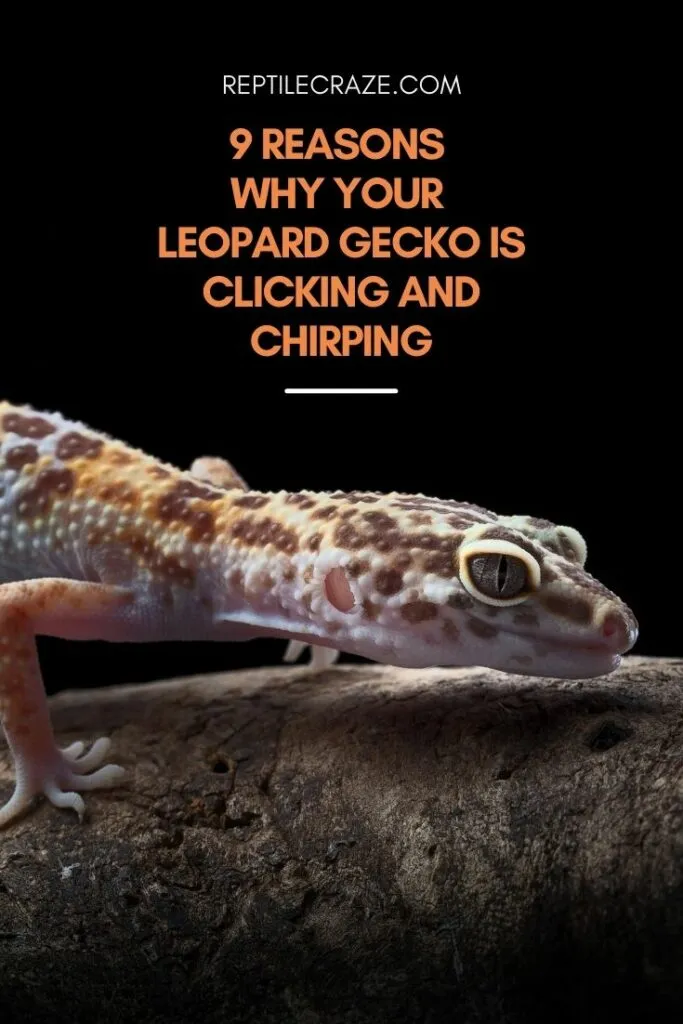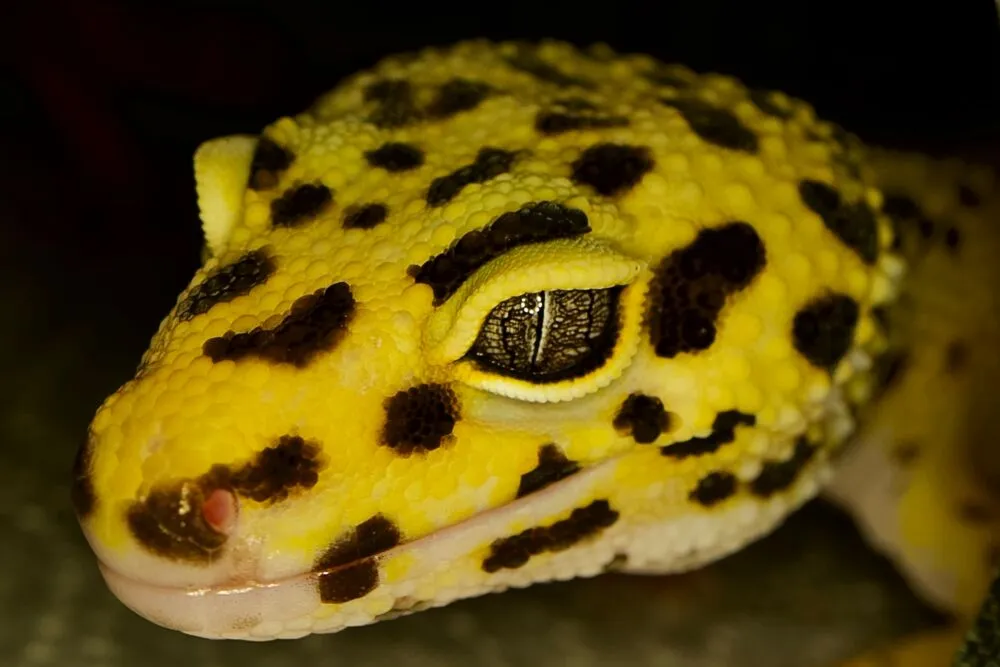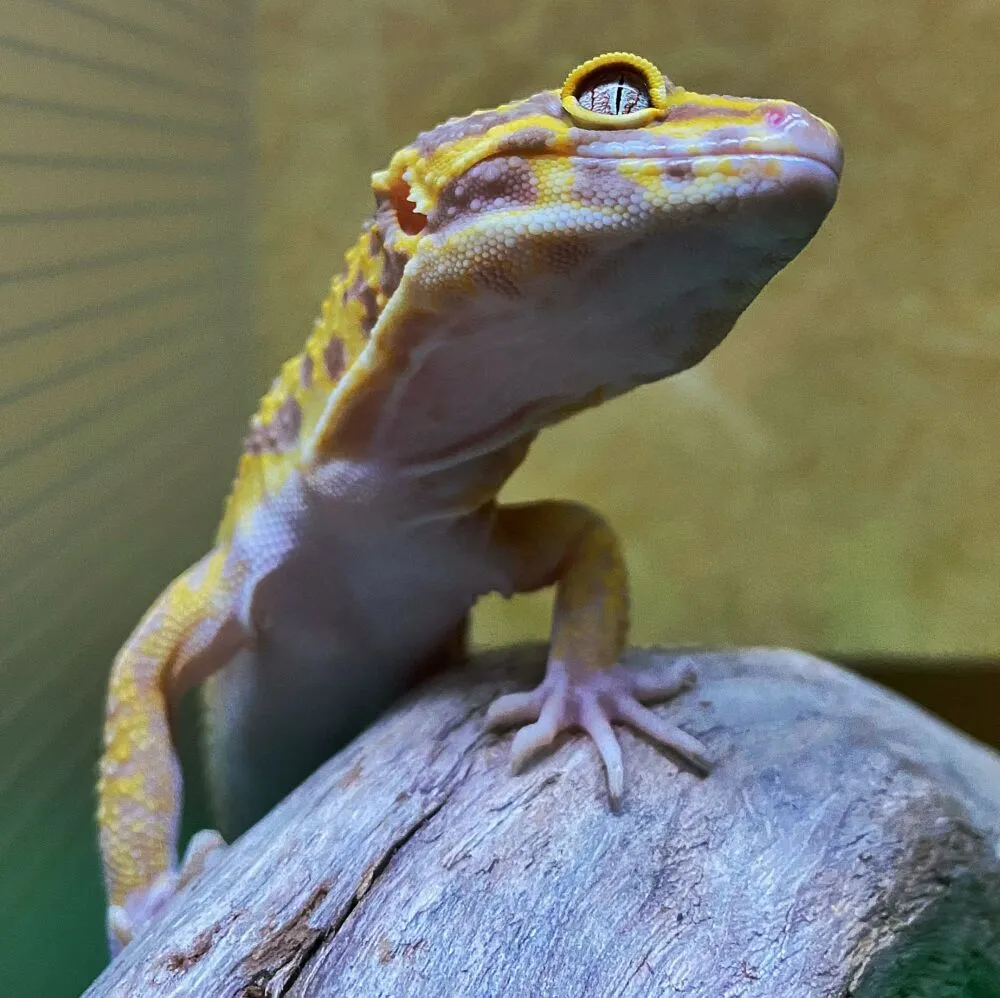
When you first get your leopard gecko, you may be nervous about taking good care of the reptile. This is normal. But when you first hear those chirps and clicks, it may cause you to feel some concern. You might wonder if you’ve done something wrong.
The reason that a leopard gecko might chirp or click is usually stress-related. If you hear any of these noises taking place, allow your gecko to take a rest, and make sure the environment around your pet is safe and free of anything that might cause them to feel stressed.
In this article, we show you exactly when leopard geckos chirp and when they click, how it sounds, and how to help your leopard gecko(s) when they are doing that.
Table of Contents
Reasons Your Leopard Gecko is Chirping or Clicking
These creatures are not known to be super talkative, but you are going to hear the noises we outlined above from time to time. Remember, this is due to them feeling a certain way- they might be feeling afraid, making a mating call, or threatened. They may also make noises when hungry!
The squeaking while performing a mating call is not something we can help with unless you are skilled enough to breed leopard geckos. However, for the other reasons you might hear your leopard geckos sounding off, there are things we can do to help them calm down.
Situations Involving Chirping and Clicking
Curious about when your leopard gecko will chirp and click, and why? Read this table.
| Reasons Why Leopard Geckos Click | Reasons Why Leopard Geckos Chirp |
| They’re hungry | They are stressed out |
| They are doing a mating call | They’re feeling unhappy |
| They’re generally unhappy (stress, handling, etc.) | Their live |
| They’re feeling afraid | |
| They haven’t gotten used to being handled | |
| Two males are being territorial |
1. Chirping And Clicking Results From Mishandling
If you don’t already know, leopard geckos are always on the defensive. After all, they are quite small and rely on being vigilant to avoid being hunted in the wild. So, when your pet sees your hand coming at them from over their heads, they naturally get frightened about it.
This may result in the chirping and clicking noises you hear, and it could very well cause them stress.
Your first task as a new Leo keeper is to learn how to safely handle your leopard gecko, so they feel comfortable when your hand makes its way into the habitat for cleaning, feeding, and interaction.
2. Your Leopard Gecko Is Not Used To Its New Home
You may hear chirps and clicks because they are stressed out about their new home. Be patient.
Did you know that it is recommended you give your leopard gecko 2 weeks to get used to their new home? Many pet owners are excited to handle and show off their leopard gecko.
They have visions of the gecko spending bits of time with them outside their habitat, keeping their owner company, and visiting with family and friends who come over. But patience is a virtue when it comes to leopard geckos.
These reptiles are very stressed out from their journey from the pet store/breeder to your home. It is important to allow them 14 days of relaxation in their new digs so they can understand they are in a safe place. No hands should be in the habitat except for cleaning and feeding purposes.

Once your two weeks are up, you can begin by introducing yourself to the leopard gecko. Start by placing your hand in the enclosure and just leaving it there for a few minutes each night.
You’ve already had your hands in there briefly for feeding and cleaning reasons, but now it’s time to leave it in there for a few more minutes to show them you mean well.
Make sure you don’t use perfumes, lotions, or other products with fragrance, so your gecko knows what YOU really smell like. Wash your hands before and after handling with this soap. It is unscented and biobased, which means it is not dangerous for your leo.
3. Use Of Intervals In Handling Prevents Clicking
One way you can prevent your leopard gecko from clicking is to use intervals for handling. This is simple and requires just five minutes of your time.
You will handle your leopard gecko for five minutes every other day. You will do this by gently reaching your hand into the enclosure and placing your hand under the leopard gecko, supporting their belly, tail, and feet. NEVER grab your Leo by the tail as they can drop it.
Do this for the first week every other day, then move to every day next week for five minutes.
It is advised you seat yourself on the ground in the event that the gecko decides to jump or falls. Keeping a soft surface around is not a bad idea, either. Be sure all other pets like cats and dogs are kept out of the room while you do this exercise.
You can do this exercise during the day or night, but it is best to do it in the early mornings or later evenings because they are crepuscular creatures after all.
It is also important for you to understand that some leopard geckos do not like being held at all. Every gecko has their own personality, and some of them just might dislike being held.
If you’ve been diligent about your handling training, and your Leo still chirps and clicks, they may just dislike being held. It’s nothing personal- just the personality of that particular gecko. Be sure to respect your pet and place them back in their
4. The Leopard Gecko Enclosure Isn’t Ideal
You have likely already set up your enclosure if you are reading this. But if you haven’t done so, consider opting for an enclosure that opens from the front.
The reasoning behind this is that it can reduce the chirps and clicks your leopard gecko makes out of stress.
If your hand approaches them from the front instead of above, they may have a better time adjusting to it. It will make their lives much less stressful, as well.
If it’s not too much financial or logistical trouble, strongly consider picking one of these up as it will make your gecko’s life that much easier. Here is one such tank you can get on Amazon.
Try to consider it from the Leo’s perspective: A foreign object is reaching toward you, getting closer and closer. It smells funny, looks like nothing you’ve seen before, and might have shiny objects on it (such as rings or other jewelry).
This enters your home at random intervals during the day after you’ve gone to the bathroom or left behind uneaten
5. Your Leopard Gecko Might Fear Other Pets
Many of us own cats and dogs that are allowed to roam throughout your home. These beloved animals are friendly to us and are considered members of the family. But they can get a bit curious, especially with a tiny animal that looks like a toy.

You will want to make sure your cats and dogs are kept away from the gecko. If your Leo sees a large animal, they may feel threatened and stressed and start making those chirping and clicking noises we discussed.
As a result, keep your larger pets away from the
6. Stress Or Territorial Behavior In Leopard Geckos
Much like two roommates who just can’t get along, housing two male geckos together should be avoided.
They will no doubt fight over the territory, which makes for a very stressful environment. Females may live together, but you will need a large
Housing two Leos together, especially males, could result in that clicking you hear. As a result, only house females (but keep a second
7. Hunger Encourages Clicking And Chirping
Leopard geckos can click, chirp, or even make barking sounds because they are hungry and desire something to eat. If it’s around the normal time of day that you feed your gecko and you hear these sounds, that’s probably why- they want to have their meal.
8. Their Crickets Are Stressing Them Out
Crickets are a popular food for leopard geckos to enjoy. Plus, they are easy to come by (many are sold in local pet shops, and they can be shipped to your home), so many pet owners opt to keep them around for feeding.
But do understand that these insects can bite. They are probably the one thing that can exist inside your
Aside from biting your gecko, they can jump on your pet as well. Many crickets could start attacking the leopard gecko as well.
It is wise instead to feed crickets accordingly. Here are some tips for safe cricket feeding:
Opt for crickets based on the size of the gecko. Go for smaller ones if feeding a baby or juvenile and go for ones slightly larger if feeding adults. These crickets (check them out here) have a good size for adult leos and they are already gut-loaded.
Only give two at a time. This will prevent the gecko from being overpowered.
Pick them up using tweezers by the legs (we recommend these bamboo tweezers). This can disable the legs so they cannot jump around and harm your leopard gecko but still move a bit, so your Leo gets the hunting experience.
Monitor your gecko while they eat and remove any uneaten crickets at the end.
9. Mating Calls Of Leopard Geckos
In some cases, chirps and squeaks mean the leopard gecko is performing a mating call. You won’t hear a click for this scenario as that nearly always signifies discomfort. However, you will hear the male doing a “tail-vibration” exercise, which almost sounds like a rattle.
The female gecko will stand still, and the male will grasp the neck while copulation takes place. This is normal, and mating takes only three minutes at most.
Various Sounds Your Leopard Gecko Will Make
You will come to find that your leopard gecko makes lots of different noises as you get to know your pet. They can make screams, barks, chirps, and clicks.
Clicking is usually an indicator that they are unhappy in some way. Chirps are usually mating calls, and screaming is a defensive action taken by the gecko. In case you are curious, we’ve lined up a few YouTube videos that illustrate these sounds.
Screaming is probably the most common sound these reptile owners report hearing. This is most often heard by new owners who want to be close to their pets and interact with them. They don’t realize that their pet is asking to be given some space!
When this happens, the leopard gecko might try to attack. Of course, they cannot hurt you due to their small size, but it’s best to gently set them back down into their habitat and allow them a chance to relax.
You will see this more in baby and juvenile leopard geckos because they aren’t used to interacting with their human companions. With proper handling and training, your leopard gecko will become used to your presence.
Conclusion
We hope this discussion of why your leopard gecko is chirping and clicking has been helpful to you. Mating could be the answer, but since most owners will be housing a single leopard gecko, stress is more than likely the culprit.
Be sure your Leo’s environment is stress-free to avoid these sounds. They may sound cute, but they’re not for entertainment’s sake.
- Enchi Ball Python: A Unique and Stunning Morph of Python regius - March 27, 2025
- Emerald Tree Monitor: The Enigmatic Green Guardian of the Rainforest - March 26, 2025
- The Egyptian Cobra (Naja haje): A Fascinating Serpent - March 25, 2025
